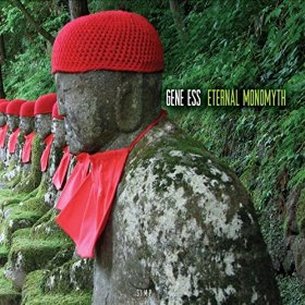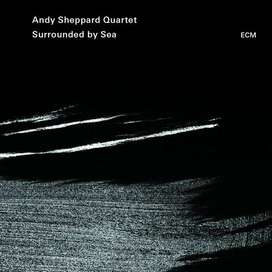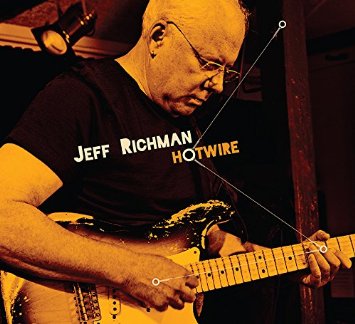 Eternal Monomyth on Simp Records (SIMP141105)
Eternal Monomyth on Simp Records (SIMP141105) Ess has been a fixture in the Jazz world since he was 14 years of age and has played with giants such as Ali Rashied, Ravi Coltrane and Clark Terry. He is joined on “Eternal Monomyth” by John Escreet (piano), Thomson Kneeland (bass) and Clarence Penn (drums) along with Thana Alexa.
It has been two years since the release of “Fractal Attraction” and his own hero’s quest has continued into what Ess calls “the peaks and valleys… of performance.”
Born in Tokyo and raised in Okinawa, there are inescapable themes and motifs that are evident from both of those cultural environments. Joined with Japanese and with Okinawan musical aesthetics (and they are not the same) is his reading of Joseph Campbell and Arthur Schopenhauer. It is, in fact, Ess’ understanding of Campbell that provides the context of the present album.
“Forsaken Island” is the introductory track on the album. Thana Alexa’s intonations open the piece. Gene Ess continues where he left off on “Fractal Attraction” and his artistry is sterling. John Escreet’s piano work is crystal. Alexa is marvelous.
Alexa has stated, “This divide between vocalists and instrumentalists was very much a problem for me. Whether it was through the curriculum or just through the psychology of the musicians, vocalists were oftentimes separated and classed as something different.”
It is clear on this album, however, that Gene Ess has focused on the instrumental aspect of Alexa’s voice and in pays tremendous dividends. The two of them have managed this arrangement very well in their two recordings together.
“The Trials,” like all of the compositions on “Eternal Monomyth” is by Gene Ess. Clarence Penn turns in some straight-up Jazz drumming and Escreet is on fire. The paired vocals and guitar is exciting stuff.
Penn gets to introduce “Entrance/Exit” with his imaginative percussion. Alexa trades with Ess and Escreet, then follows her own vocal improvisations that are picked up by Ess’ brilliant guitar work. Kneeland’s bass is so steady and subdued that he can get overlooked. He bears close and appreciative attention. The song is superbly crafter and is extremely enjoyable.
“Summer Cantabile” is again written by Ess but with lyrics by Alexa. The lyrics are, most assuredly, well sung but the words themselves are developed remarkably well. Ess accompanies on acoustic guitar and together they create a splendid interlude to the energy that surrounds the track before and after.
Percussion and progression follow with “Drakaina.” It is a lovely piece with tight cohesion between piano, bass and drums. The swing is counter-balanced by the vocals and guitar duo. Penn may have been at his best on this track but, then, the same might be said for Escreet and Kneeland, as well. This could be the tightest track of all.
“Blues for Ryo” follows “Drakaina.” The name Ryo may be a male or a female name in Japanese—one of the few such names. The track starts off with Ess’ solo guitar. Alexa’s improve is vivid and fun and Escreet’s accompaniment is finely subdued. The bluesy shift is handled so well by Ess who weaves a gorgeous blues with Kneeland and Penn spot on.
“Mono No Aware” (Transience of Things) is a rae moment of enlightenment. Like George Harrison’s “All Things Must Pass,” it is the profound understanding that “things fall apart,” to quote Achebe. It is Ess’ philosophical assessment of the 2nd Law of Thermodynamics—entropy increases. In his liner notes, Ess mentions the principle of wabi-sabi. It is the concept of beauty that acknowledges its nature of imperfection and incompleteness. It is always an unfinished work. Ess sums it up as his approach to music.
That sense of beauty is profoundly apparent on this piece with lyrics, once more, by Thana Alexa. Music and lyrics alike are deeply moving. Imperfect? By Ess’ own description, surely. But certainly not by much.
“Into the New World” is the final piece on the album. Kneeland lights it up alongside Penn with everyone expending what energy they have in reserve, so it seems. It is both smooth (I don’t mean that in a bad way) and it is explosive. A fantastic finale.
Gene Ess has crafted a work of wonder with “Eternal Monomyth.” Like the hero’s quest it envisions, it is a transcendent journey of the musical self—a tonal quest for beauty. It is the harmonic pilgrimage to transformation and we are indeed changed by it. In such a sojourn, those who accompany Ess—even as simple listeners—the travelers reach the destination where we understanding beauty just a little more than we did before.
Visit Gene Ess' web site at: http://www.jazzgenemusic.com/
Purchase "Eternal Monomyth" at: http://www.cdbaby.com/cd/geneess7
Like Gene on Facebook here: https://www.facebook.com/gene.ess?fref=ts
Follow more great music releases with Kari-On Productions here.


 RSS Feed
RSS Feed
